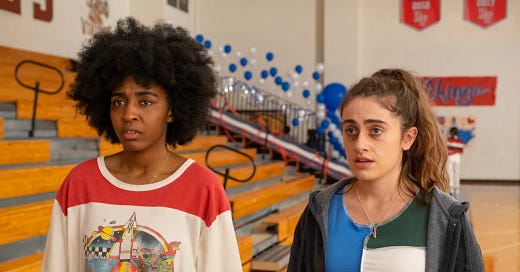Poetry Sunday Delayed! (Disguised as a Bottoms movie review)
Thanks to all who have subscribed and please keep at it! I am slowly but surely approaching the 70 mark! Only 700,000 more to go.
Over the weekend, our family went to see the newly released film Bottoms. It’s excellent. We’re not squeamish about taking our kids to R-rated films and—this will be shocking, I know—but they somehow know what lesbians are and that sometimes people of the same gender love each other, crush on each other, and go to high school together. (For R-rated, I really draw the line at drug use and overly explicit sexual content.)
Bottoms proved to be great and, overall, one could read it as send-up of canonical high school-based films, especially those of John Hughes (though The Breakfast Club will always mean a lot to me), as well as a strong critique of how significantly athletic culture defines masculine identity. But as much press as Barbie is getting about engaging with gender, Bottoms delivers deeply serious subtexts that are multifaceted, or intersectional: gender, masculinity, sexuality, domestic violence, and race step forward as prominent issues, but never in an obvious, ham-handed way. The film’s classification as a comedy creates space for outlandish or shocking moments, but smaller segments purposefully shed that context, hitting me hard and in a way that, frankly, made me feel sad and then later reflective (this is the response that a piece of art should inspire).
Bottoms made me think a lot about masculinity (including my own), especially as the “men’s movement” and themes like “what’s wrong with men?” reenter our public square. There are just a few examples here and here. As the only male in my household (other than Rocco, a cat), there is an element of Bottoms that correctly identifies and tugs on a negative thread or two, or as the kids say these days, made me “feel seen.” But all of that said, the greatest service this film provides is iterating that Fight Club was never meant to be something men should aspire to; it critiqued those aspirations (wow, did millions miss that boat!). Men often struggle at interpreting images of themselves, as I’m sure many will miss Bottoms’ very brief critique of, for example, the “sad but angry” white outcast student who is mad he doesn’t get to blow up the school to settle whatever outsized internal grievances he holds (also, there is no such thing as “incels”).
First, go see Bottoms! Second, seeing Bottoms, as well as the feelings I came away with, made me think of the poet Tony Hoagland, who wrote this amazing poem, with an amazing title, about his journey through masculinity. I didn’t post a poem on Sunday, so I am making up for it now.
***
Dickhead by Tony Hoagland To whomever taught me the word dickhead, I owe a debt of thanks. It gave me a way of being in the world of men when I most needed one, when I was pale and scrawny, naked, goosefleshed as a plucked chicken in a supermarket cooler, a poor forked thing stranded in the savage universe of puberty, where wild jockstraps flew across the steamy skies of locker rooms, and everybody fell down laughing at jokes I didn’t understand. But dickhead was a word as dumb and democratic as a hammer, an object you could pick up in your hand, and swing, saying dickhead this and dickhead that, a song that meant the world was yours enough at least to bang on like a garbage can, and knowing it, and having that beautiful ugliness always cocked and loaded in my mind, protected me and calmed me like a psalm. Now I have myself become a beautiful ugliness, and my weakness is a fact so well established that it makes me calm, and I am calm enough to be grateful for the lives I never have to live again; but I remember all the bad old days back in the world of men, when everything was serious, mysterious, scary, hairier and bigger than I was; I recall when flesh was what I hated, feared and was excluded from: Hardly knowing what I did, or what would come of it, I made a word my friend.
***
Hope everyone had a great holiday weekend!




